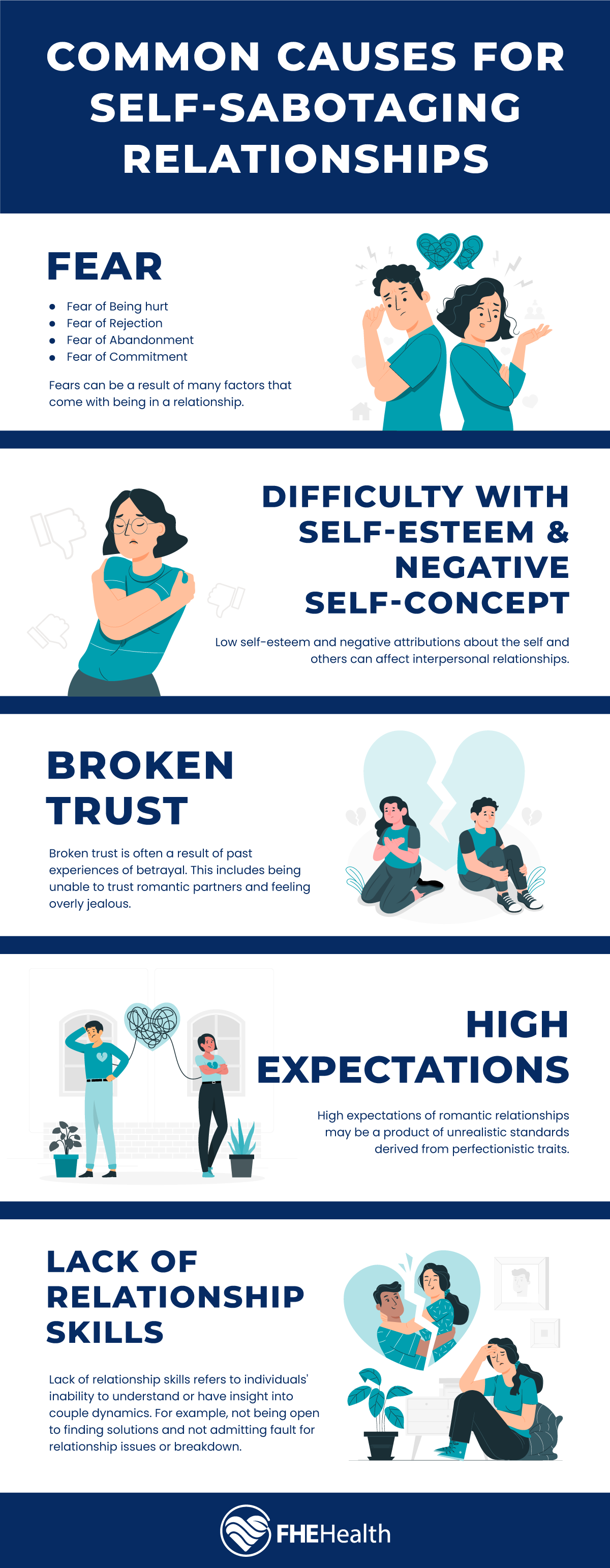
Imagine meeting someone new and feeling that unparalleled excitement and potential for a future together. However, it doesn’t take long before you find yourself derailing the romance. Whether it’s avoiding commitment altogether or, on the contrary, acting too clingy too soon, your behavior could lead to the other person walking away. And yet you can’t seem to stop the endless and destructive cycle of self-sabotaging relationships.
It’s hard to understand why you might work against your own best interest and push away someone you care about. But this is actually a common defense tactic many people engage in consciously or subconsciously. So how do you know you’re doing it, and how do you put a stop to it?
Are You Guilty of Self-Sabotaging Relationships?
Relationship self-sabotage can be difficult to address, as it’s often the result of you working against yourself. Sometimes it’s easy to recognize when you’re pushing your partner away, but other signs can also be subtle and hard to spot without much self-reflection. If you find yourself doing one or more of the following, you might already be engaging in relationship self-destruction.
- Avoiding commitment. This is a common sign of self-sabotaging tendencies. You might refuse to meet their friends and family or constantly come up with excuses not to introduce them to yours. In longer-term relationships, you might avoid conversations about moving in together, getting married or having children while citing your need for independence.
- Being overly critical of your partner. At the start of your relationship, you couldn’t get enough of their unique quirks. Now your partner can’t seem to do anything right in your eyes. From their cooking to how they dress to their hobbies, everything your partner says or does seems to irritate you beyond measure.
- Unreasonable expectations. This also falls under clinginess. You may become obsessed with knowing where your other half is at all times, demand replies to all your texts and calls immediately and accuse them of cheating when they don’t comply.
- Pulling away emotionally. Feeling emotionally connected to your partner is crucial to any successful romantic relationship. Keeping your partner at arm’s length and never opening up to them about your inner thoughts and feelings can lead to them feeling unimportant.
- Pursuing other romantic entanglements. Infidelity is one of the more evident signs you’re self-sabotaging your relationship.
- Treating your partner with contempt. Sometimes self-sabotage turns into abusive behaviors, including gaslighting, manipulation, verbal abuse and, in more extreme cases, physical violence.
- Drugs and alcohol abuse. When you’re in a relationship, self-destructive behavior like substance abuse doesn’t just affect you — it can negatively impact your partner and their emotional stability.
Why People Sabotage Themselves
There’s limited research into how self-destructive behaviors connect to romantic relationships. At its core, self-sabotage is a misguided attempt at self-preservation. People who push away their partners may be trying to protect themselves from the hurt of abandonment, or they may feel undeserving of happiness.
Building healthy relationships takes a lot of work. For people with attachment issues, the prospect of being safe and secure is scarier than the alternative. The fear of being emotionally exposed or getting hurt leads to them raising emotional barriers, making it impossible for a potential partner to get through.
Sabotaging relationships may also stem from past traumatic experiences coupled with a distorted sense of self. People with low self-esteem struggle to believe they deserve happiness, so they undermine relationships that seem too good to be true. Previous heartbreaks or childhood experiences can create emotional scars that manifest as self-sabotage in new relationships.
Confusingly, fear of abandonment can drive people to push their partners away. You may treat your spouse badly or even cheat on them because you’re worried they’ll leave, but your behavior becomes a self-fulfilling prophecy.
Tips for Breaking Unhealthy Self-Sabotaging Habits
The first step to overcoming self-sabotage in your relationship is recognizing that you’re doing it. You need to honestly look at what caused previous breakups and note patterns of behavior that contributed to those relationships ending. When you become accountable for the role you played in the past, you can start working on healthier ways of coping with relationship challenges.
- Talk about your feelings. It may seem like obvious advice, but lack of communication is among the most common causes of relationship issues. Not telling your partner what you need from them can create hurt feelings and confusion on both sides.
- Know your triggers. Even if subconscious, a tendency to self-sabotage relationships starts somewhere. Some people push back when their new partners mention commitment, such as joking about moving in together. For others, not getting a reply to a text could automatically trigger a fear of abandonment. Try looking at your previous relationships and see if there’s anything specific in your past triggering unhealthy behaviors.
- Challenge negative thoughts. Most of the time, self-sabotage stems from our anxieties. When you identify the thoughts that cause you to lash out, you can start work on switching your thinking patterns. Just because a past relationship ended in heartache doesn’t mean the cycle needs to constantly repeat itself.
- Prioritize self-improvement. When stuck in a pattern of self-defeating behaviors, it’s hard to break free from it. Old habits, even when harmful, are more comfortable because they’re familiar. Working on your self-esteem and prioritizing self-care is an important step to breaking those habits.
When to Get Professional Advice
Relationships are hard without added complications from self-sabotage. Sometimes it takes more than two to reach a breakthrough in your relationship. If you can’t solve the issues you’re facing as a couple, you might consider therapy to get professional relationship advice.
Individual therapy can help you address the underlying issues causing you to undermine your relationship. Couples therapy is also a good option when you need to find ways to communicate and achieve common ground with your partner — these therapists specialize in inciting breakthroughs in relationships.
Are you and your partner constantly at odds, or are you concerned you may be self-sabotaging your relationship? Our mental health professionals offer a range of therapies and programs to help you get to the root cause and address unhealthy behaviors. Contact us to speak to one of our compassionate and nonjudgmental counselors. We’re available to take your call at all hours of the day or night.







